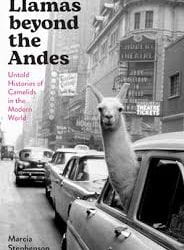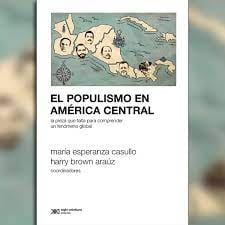A Review of Evading the Patronage Trap: Interest Representation in Mexico
I was asked to write a “personal review,” so here it is. This fabulous book by Brian Palmer-Rubin made me jealous. Evading the Patronage Trap: Interest Representation in Mexico is derived from his dissertation. I have recently adapted my own dissertation into a book. I wasted an insane amount of time trying to make sense of my super messy fieldwork notes—who mentioned this or that, where that anecdote was from, or what phrase which person said. I am 100% sure Palmer-Rubin had none of those issues. The amount of fieldwork and the attention to detail in every single page and footnote in Evading the Patronage Trap is outstanding! I am fully convinced he has hundreds of pages of fieldwork notes with a clear classification system for his interviews—all with clear labels for type of actor, place, and date of the interview. He probably even has a nice handwriting!

Evading the Patronage Trap: Interest Representation in Mexico by Brian Palmer-Rubin (University of Michigan Press, 2022)
Let me tell you why you need to read this book and share my jealousy. Broadly speaking, Evading the Patronage Trap is about explaining inequality. More specifically, and in Palmer-Rubin’s words, the book is about explaining “disparities in economic representation” that are at the core of inequality in the most unequal region in the world. It starts with a big question: “Why (…) have Latin American democracies proven unable to confront the structural inequalities that cripple their economies and leave their masses without opportunity?” (p. 3). This is one of the most crucial questions in Latin America, without a doubt. Palmer-Rubin argues that, in spite of important advances in democratic representation, innovations in democratic deepening (such as the expansion of participatory institutions) and significant expansion of social and economic rights, the economic interests of the non-elite are still not advanced. This is puzzling. It is also at the core of understanding Latin America’s persistent inequality. In Palmer-Rubin’s words: “I contend that we may lay the blame at the feet of these countries’ systems of interest representation, which exhibit an exaggerated version of ‘biased pluralism,’ a system in which the demands of organizations representing economic elites—especially large corporations—predominate over those that represent the interests of the much more numerous non-elites” (p. 3).
What explains this biased pluralism? The answer is in the interplay between political parties, interest organizations and the people they represent. Evading the Patronage Trap explains variation in models of representation. Whether the representation is programmatic—translating members’ collective interests into policy demands—or clientelistic—brokering individualized benefits from the state to members—depends on the relationships that organizations develop with their followers and with political parties. Most often, non-elite interest organizations specialize in demand making for patronage—the discretional allocation of state benefits—rather than in programmatic policies. Indeed, the patronage trap is about the pressures that non-elite interest organizations often receive from their members and political parties to broker state benefits rather than programmatic policies that could help their members’ well-being in the long term. For interest organizations to focus on programmatic demand making, both the organization and an ideologically close political party must converge. Unfortunately, this convergence is rare for popular sector organizations and left-wing parties, but it is more common between the organizations of the middle-class and right-wing parties.
What’s the origin of these asymmetries, which generate biased pluralism in the region? The answer in Evading the Patronage Trap has two parts, one about the interest organization and the other about the political party. According to Palmer-Rubin, interest organizations’ demands are shaped by the strategies they use to recruit, retain and mobilize their members. Organizations that can generate their own incentives have more autonomy for programmatic demand making. Those without internally generated organizational capacity cannot evade the patronage trap. In the case of parties, origins matter. Political parties’ origins shape their future capacity to form either programmatic or patronage-based linkages with interest organizations. Parties that formed ties to ideologically aligned interest organizations before they ran for elected office go on to incorporate these organizations into programmatic policies once they got to power (for example, Mexico’s PAN and small-business organizations). In contrast, parties that only came into contact with organizations while running for office have not invested in generating programmatic linkages with those organization (for example, Mexico’s PRD and peasant organizations). When interest organizations and political parties coincide in their preferences for programmatic or patronage-based linkages, that becomes self-reinforcing. Crucially, when organizations become diverted into patronage politics, the economic demands of the masses go unheard in the policies that most affect their lives and, along the way, their economic interests go unrepresented: the patronage trap.
This persuasive argument is tested in Mexico using the cases of peasant and small business associations and their relationships with the Partido Revolucionario Institucional (PRI), Partido de la Revolución Democrática (PRD) and Partido de Acción Nacional (PAN) at the subnational level (in Estado de México, Jalisco and Michoacán). The qualitative and quantitative evidence includes an original survey of organizations in the small-scale agriculture and small-business sector, an original dataset of small-business subsidies, participant observation, and more than 100 interviews. Each and every chapter in the book reflects a broad knowledge of the cases and a you-will-be-jealous-too level of detail. This work is even more impressive considering that literature on the interest organizations that Palmer-Rubin studies is almost nonexistent.
Beyond the wonderful fieldwork that translates into vivid and persuasive case studies, I very much enjoy a couple of other things in Evading the Patronage Trap. First, the book asks a big and important question about inequality that has no easy answer. I also really like that the answer focuses on collective actors. During the experimental turn in political science (and probably because of it) in the last 20 years or so, the discipline has become a little too focused on individual-level explanations that can be answered with individual-level data. Evading the Patronage Trap puts collective actors back at the center of the scene. Going back to old-fashioned collective actors is refreshing. Moreover, as Palmer-Rubin puts it, organized economic interests are not “political actors in extinction,” but they have been neglected lately as objects of study. Finally, unlike a lot of the research on patronage, Evading the Patronage Trap, gives agency to the poor. Indeed, “poverty is not destiny.” It is harder for organizations of the poor (the non-elite) to generate organizational capacity without patronage, but, as the book brilliantly shows, it is not impossible. This is a refreshing conclusion amid literature filled with self-enforcing arguments about the persistence of patronage politics in Latin America.
In other words, Evading the Patronage Trap is substantively and methodologically a must read for anyone interested in inequality, interest representation and the quality of democracy more broadly. Anyone looking for a masterclass on intensive and effective fieldwork should take a look as well. You will share my jealousy. I promise.
Virginia Oliveros is an Associate Professor in the Department of Political Science at Tulane University. Her latest book is Patronage at Work: Public Jobs and Political Services in Argentina.
Related Articles
A Review of Llamas beyond the Andes: Untold Histories of Camelids in the Modern World
Marcia Stephenson’s Llamas beyond the Andes is about humans making use of another animal. With a dustjacket image of Llinda Llee Llama riding in the back of an automobile in mid-20th-century Times Square, this book illustrates how sentient nature has been engulfed by human cultural objectives since Columbus’ arrival in the Americas and the rise of Europe’s global imperial ventures. The window on all this is American camelids: llamas, alpacas and their wild relations, guanacos and vicuñas.
A Review of Born in Blood and Fire
The fourth edition of Born in Blood and Fire is a concise yet comprehensive account of the intriguing history of Latin America and will be followed this year by a fifth edition.
A Review of El populismo en América Latina. La pieza que falta para comprender un fenómeno global
In 1946, during a campaign event in Argentina, then-candidate for president Juan Domingo Perón formulated a slogan, “Braden or Perón,” with which he could effectively discredit his opponents and position himself as a defender of national dignity against a foreign power.




